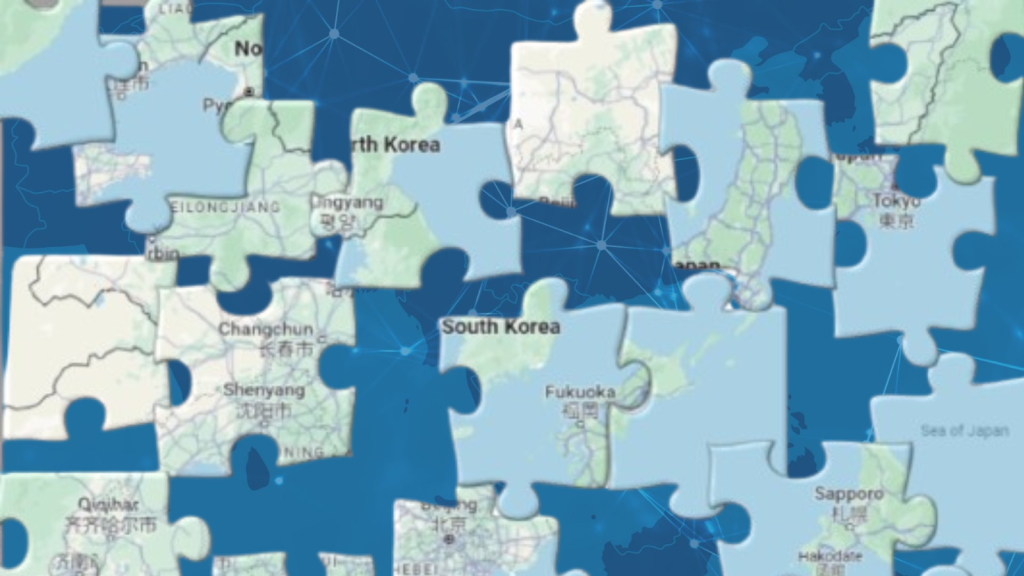2024年4月19日

Image: policy puzzle map of Northeast Asia generated from Puzzle Paradigm here
Leon Sigal, Morton Halperin, Peter Hayes,
Chung-in Moon, John Delury, Tom Pickering
April 19, 2024
This report is published under a 4.0 International Creative Commons License the terms of which are found here.
This report is simultaneously published by the Asia-Pacific Leadership Network, Nautilus Institute, and the Research Center for Nuclear Weapons Abolition, Nagasaki University (RECNA).
This report is simultaneously published by the Asia-Pacific Leadership Network, Nautilus Institute, and the Research Center for Nuclear Weapons Abolition, Nagasaki University (RECNA).
Acknowledgements: Funding from John D. and Catherine T. MacArthur Foundation and New Land Foundation.
Overview
|
In this paper we revisit the concept of comprehensive security in Northeast Asia as the guiding principle that should be used to reduce tension, avoid war, and re-engage on a constructive peace-making cooperative security agenda in Northeast Asia, including reducing then eliminating the threat of nuclear war. In section 1, we outline the mostly negative security trends in the region over the last five years. In section 2, we explain how the DPRK’s1 nuclear breakout has become the most urgent threat in the region, but also now demands a more indirect approach at a regional level than in 2018 when we last addressed the issue of comprehensive security.2 In section 3, we explore how inter-Korean relations have spiraled into hostility, rupture, and potentially rapidly escalating conflict and unraveled hard-won channels of communication, cooperation, and collaboration due to how the two Koreas have responded to the evolving external security context and to their respective domestic imperatives. In section 4, we suggest four steps that could ease insecurity in the region, especially in Korea, namely: |
|
|
a) The US and China tacitly act in concert whereby the US tries to restrain Seoul from provocative threats or actions animated at Pyongyang while China seeks to restrain Pyongyang from issuing and acting on threats, especially nuclear threats; b) China reaches out to reassure the ROK3 with concrete steps while the US takes unilateral steps to reassure the DPRK; c) The US engages China to propose a joint statement with all parties on the inadmissibility of use of nuclear weapons and a dialogue on creating a nuclear-weapons-free zone including changes in the nuclear postures of all nuclear-armed states in the region; d) The US and the ROK explicitly outline the benefits to the DPRK of curbing its nuclear arming including improved security, access to advanced information technology, access to space services, and its integration into regional and global institutions with concomitant increased stature. |
|
| In section 5, we conclude that the steps being taken to reinforce deterrence may lead to a downward spiral that leads to rather than deterring war; and that progress in easing tensions in Korea could then inspire cooperative security efforts elsewhere in Northeast Asia to the benefit of all parties in the region while re-establishing the conditions needed for a comprehensive approach to realizing the denuclearization of the Korean peninsula. | |
1 DPRK, the Democratic People’s Republic of Korea, sometimes referred to as “North Korea.” 2 See: Morton Halperin, Peter Hayes, Thomas Pickering, Leon Sigal, “GENERAL ROADMAP AND WORK PLAN FOR NUCLEAR DIPLOMACY WITH NORTH KOREA”, NAPSNet Special Reports, April 10, 2018, https://nautilus.org/napsnet/napsnet-special-reports/general-roadmap-and-work-plan-for-nuclear-diplomacy-with-north-korea/ MORTON HALPERIN, PETER HAYES, THOMAS PICKERING, LEON SIGAL, PHILIP YUN, “FROM ENEMIES TO SECURITY PARTNERS: PATHWAYS TO DENUCLEARIZATION IN KOREA”, NAPSNet Policy Forum, July 06, 2018, https://nautilus.org/napsnet/napsnet-policy-forum/from-enemies-to-security-partners-pathways-to-denuclearization-in-korea/ 3 ROK, the Republic of Korea, sometimes referred to as “South Korea.” |
|
Authors’ Profile:
John Delury is associate professor of Chinese studies at Yonsei University; Morton Halperin is an American expert on foreign policy and civil liberties; Peter Hayes is Director of the Nautilus Institute and Honorary Professor at the Centre for International Security Studies at the University of Sydney; Moon Chung-in is a distinguished professor emeritus of political science at Yonsei University; Thomas Pickering is retired US ambassador; Leon Sigal directs the Northeast Asia Cooperative Security Project.
Full text (PDF) is here.
The views represented herein are the author’s own and do not necessarily reflect the institutional positions.
The page for this project is here.

















